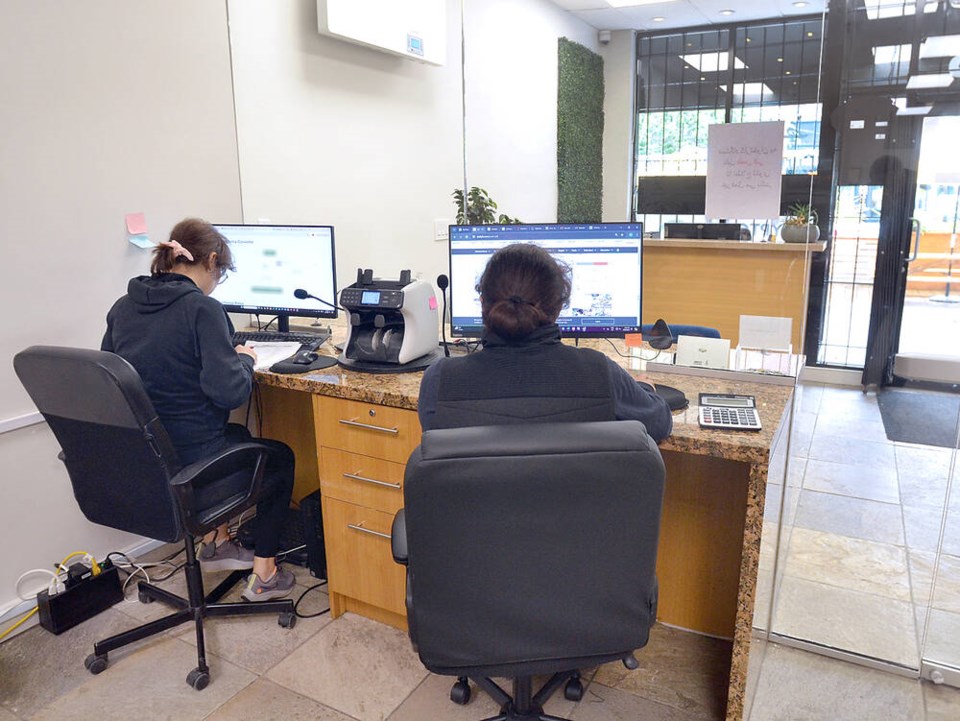The City of North Vancouver is advancing plans that would curtail new currency exchanges from opening up in prime streetlevel storefronts.
A divided council voted 4-3 Monday to schedule a public hearing for a bylaw that would ban any new “money services” businesses from operating at ground level in the city.
The types of currency exchanges in question exist largely to provide financial services to the North Shore Iranian community which, because of economic sanctions against the Islamic Republic, cannot use the traditional banking system to send or receive money from home.
But they have been proliferating at a time when council is turning its attention toward making Lonsdale Avenue a more vibrant shopping district. And there has been a push from the public to crack down on them. West Vancouver has already put limits on new currency exchanges taking up storefronts in Ambleside and Dundarave
“The idea is to maintain the animation of the street, and also, to some degree, hopefully … to limit the number. Do we need that many? Do we want to be the money services centre of the Lower Mainland? I suspect not,” said Coun. Don Bell, who moved the motion at council.
When the issue first came up in council chambers in July, Mayor Linda Buchanan sharply criticized the motion for unfairly targeting Iranian-Canadian business owners, saying it sent the wrong message about the city’s stated values of being a welcoming place.
That argument wasn’t repeated when the proposal was back for a vote on Monday, but at least three council members spoke against the bylaw, saying bans on any type of business at street level should be discussed in the context of the city’s Lonsdale “great street project” – a plan that intends to reimagine Lonsdale in ways that will support commercial activity and enhance esthetics, walkability, vibrancy and history.
“I agree with the intent, and I understand the purpose. For me, I still have issue with the process – that being that we’re changing the bylaws for specifically one type of business, when I think we know that there are other types of businesses that also don’t animate the streetscape,” said Coun. Jessica McIlroy. “I would still prefer us to do a more wholesome look.”
Coun. Shervin Shahriari stressed that time was of the essence and that council should act before waiting for the Lonsdale great street project to be complete.
“I think we all agree that we have a long, long way to go in achieving that. And I think this is a step towards that goal. As mentioned, it may not be all perfect, and nothing is perfect,” he said. “From my recollection, we have gone from something like having four to five of these businesses to maybe 20 or 25-plus in the city. The growth rate is concerning and so it does deserve a special look at this situation.”
Couns. Holly Back and Tony Valente joined Bell and Shahrari in voting the motion through. Buchanan, McIlroy and Coun. Angela Girard voted against.
North Shore currency exchange owner reacts
Dina Ser, director of Hafez Exchange, which has operated on Lonsdale since 2011, takes a nuanced position. Even though it might mean fewer competitors in the market, Ser said she doesn’t necessarily agree with council’s direction.
“[Currency exchanges] are actually providing a service and they’re all making enough money to be surviving, meaning that they have enough clients,” she said. “I believe Lonsdale has enough restaurants, but there are so many stores that are empty on Lonsdale. And if a money service business wants to take it, why not?”
About 90 per cent of Hafez’s business is bringing Iranian Rials and converting them to Canadian dollars.
Students who are studying here and those who recently arrived almost always need money from family or businesses back home, she added.
“For them, it’s much harder to start over here so their income comes from Iran. And in a case where money service businesses would be discontinued, their lives would be really hard,” she said.
Ser agreed there has been a boom in the number of new currency exchanges, but she said that is a reflection of a growth in immigrants who want to start businesses. The regulatory barriers to opening a money services business are “almost non-existent,” she said.
Currency exchanges must be registered with and provide information to the Financial Transactions and Reports Analysis Centre of Canada, but, she said, apart from audits that only happen every few years, FINTRAC does not provide a lot of direct oversight.
“To be honest, I don’t think this is a city problem. I think this is more of a FINTRAC problem that they should address,” she said.
The city's public hearing for the bylaw ammendment is scheduled for Nov. 4.



